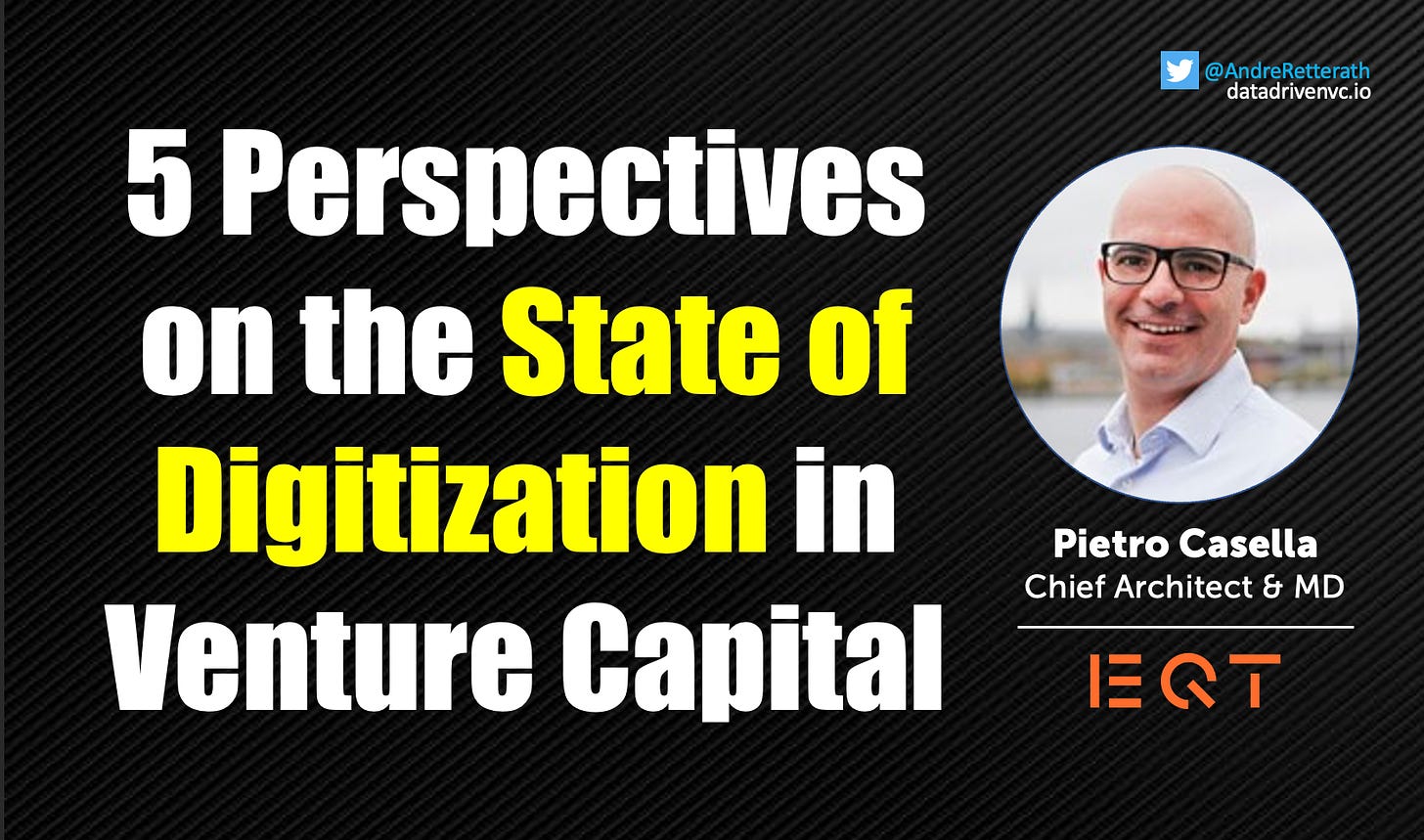5 Perspectives on the State of Digitization in Venture Capital from Pietro Casella (EQT)
DDVC #43: Where venture capital and data intersect. Every week.
👋 Hi, I’m Andre and welcome to my weekly newsletter, Data-driven VC. Every Thursday I cover hands-on insights into data-driven innovation in venture capital and connect the dots between the latest research, reviews of novel tools and datasets, deep dives into various VC tech stacks, interviews with experts, and the implications for all stakeholders. Follow along to understand how data-driven approaches change the game, why it matters, and what it means for you.
Current subscribers: 11,152, +200 since last week
Brought to you by Harmonic AI - the largest and freshest startup database
Harmonic finds and tracks the world’s startups, covering 12M companies from inception to IPO. Find founders 6-12 months before those who depend on legacy databases. Get full visibility into all the startups that match your thesis, as soon as they become a match. Our customers find and qualify startups, track their portcos, and automate their data hygiene - wherever they work. What companies and signals are you missing without a complete view of the startup ecosystem?
Following the successful launch of the “Data-driven VC Landscape 2023” earlier this year, I’d like to start a series of short Q&A sessions with some of the top thought leaders from the report.
Today, I’m excited to share the first of these episodes with Pietro Casella, MD & Chief Architect at EQT. Starting in 2016, Pietro and his team have been developing one of the most innovative data-driven platforms called Motherbrain. Thank you for sharing your valuable perspectives below, Pietro!
#1 What’s the status of the VC industry in terms of data-driven initiatives and AI?
PC: The data-driven VC space has matured a lot. As I meet more VC peers, I continue to be impressed with the innovations and craftsmanship of typically very small teams, sometimes even one-person bands. You see great data work ranging from extreme operational efficiency all the way to thesis matching at scale, forecasting, or macro analysis of trends.
That said, there is still a long way to go, not only by VCs that haven't started but, most importantly VCs that are not yet tapping their full potential. One example I joke about is the correlation of changing your Linkedin title to *stealth* with the amount of VC spam in your inbox… just like fishing with dynamite, it reflects the prevalence of shallow ideas about what to do with these superpowers.
To truly differentiate, VCs must go deeper, and use first-principles thinking in combination with Data and AI techniques, but keep the genuine interest, personal touch, and value add approach that characterizes great VCs.
#2 Why should VCs become more data-driven?
PC: The most important reason for using technology is how much it teaches you about technology itself. Most of the tech you learned *before* you became a VC is now mostly outdated.
Finding a way to stay fresh by leveraging technology leads to a deeper understanding of the most critical opportunities in the coming years. It's a win-win. So, use AI, use Data, feel it, and then predict the future, empathize with your founders, and become a better investor. It's the ultimate flywheel effect.
#3 What’s your perspective on buy versus build? Is it “either-or”? Combination?
PC: It's important to understand that buy vs build is a spectrum, not a preference. But finding the right blend is critical for balancing between moving fast, focusing on high-value activities, and having an architecture that enables the type of innovation and scalability you want.
While I usually over-index on buy for non-core things, the introduction of AI coders dramatically increases the options on build, so remember to consult your ChatBot of preference before your next buy ;-)
#4 What are your major challenges or bottlenecks when looking at data-driven initiatives?
PC: Data quality and data interoperability have historically been great barriers. While the modern data stack made things easier to manage, I generally expected much more from data providers. My current approach is to start with less data but higher quality, focus on niche datasets targeting the thesis you are pursuing, and expand from there. This contrasts with the boil the ocean, matching every dataset approach of the past, which is valid but delays time to value.
The second bottleneck I hear from teams in the industry is leadership buy-in. I think many leaders in VC could make more aggressive bets on Data centricity and support the necessary interventions such as changing rituals around data feedback loops. That said, as data-driven VCs outperform the others, the market will take care of that. :-)
#5 What would you recommend to a VC firm that just started out to become more data-driven?
PC: Bet on small hybrid teams with investment professionals and technology professionals side by side. The most impressive things I've seen come from hybrid teams with aligned incentives.
Secondly, engage the data-driven VC community. It is very open and welcoming, I learn a bunch from it. Lastly, keep your eye on the ball. It is very easy to go down rabbit holes when working with data, so it is critical to keep the level of pragmatism very high and go wide instead of deep.
This is it for today. Hopefully, you enjoyed this short interview-style episode with DDVC thought leader Pietro Casella.
Stay driven,
Andre
PS: If you want to learn more about Pietro’s perspectives, you should check out his extensive interview with Ernests from the
podcast hereThank you for reading. If you liked it, share it with your friends, colleagues, and everyone interested in data-driven innovation. Subscribe below and follow me on LinkedIn or Twitter to never miss data-driven VC updates again.
What do you think about my weekly Newsletter? Love it | It's great | Good | Okay-ish | Stop it
If you have any suggestions, want me to feature an article, research, your tech stack or list a job, hit me up! I would love to include it in my next edition😎





